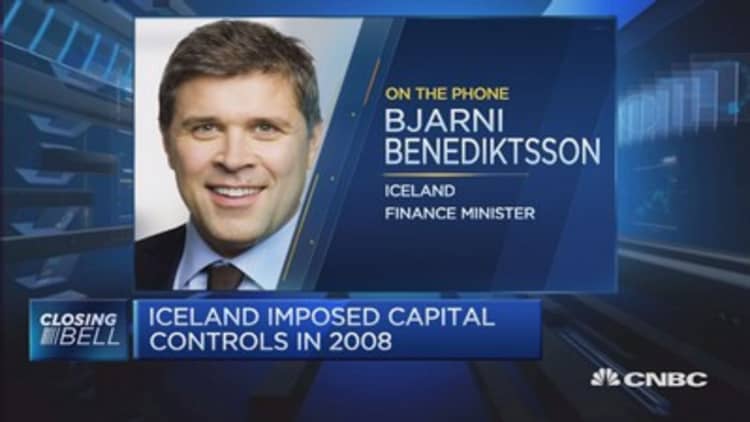
Iceland is to introduce a hefty 39 percent exit tax on assets from its failed banks starting next April as part of moves to lift capital controls imposed after the tiny island nation's economy collapsed seven years ago.
Following a vote in Parliament, the government said Monday it will impose the tax as part of the lifting of the capital controls. The hope is that the end of the controls won't prompt a mass exodus of money from the country if the cost of doing so is prohibitive.
The moves announced Monday are designed to free up about 1,200 billion kronur ($9 billion) in assets have faced restrictions since the 2008 financial crisis, when Iceland went from economic powerhouse to financial disaster almost overnight.
The government said the so-called "stability tax" could raise as much as 850 billion kronur.
Prime Minister Sigmundur David Gunnlaugsson said the government was taking "unprecedented measures ... to address unprecedented circumstances."
In 2008, the small North Atlantic nation with a population of 330,000, became one of the biggest casualties of the global financial crisis when its debt-burdened commercial banks collapsed under the strain of the worldwide credit squeeze. The value of the krona currency plummeted and Iceland was forced to seek a bailout from Europe and the International Monetary Fund.
The economy has since recovered, and Iceland's center-right government wants to ease controls on money entering and leaving the country without triggering a stampede of assets out of Iceland.
"It's easier to impose controls than lift them," said Finance Minister Bjarni Benediktsson. "We thought that we would lift the controls six months later, or two years, but the task was changing and was complex. Almost seven years have passed and we are at this important milestone."
Thorolfur Matthiasson, an economics professor at the University of Iceland, said the government faced a tricky balancing act.
"The danger is capital flight and a consequent fall of the value of the krona," he said. "That would be tantamount to October 2008, bringing back bad memories for ordinary people and possibly making most businesses unsustainable due to balance-sheet problems."

